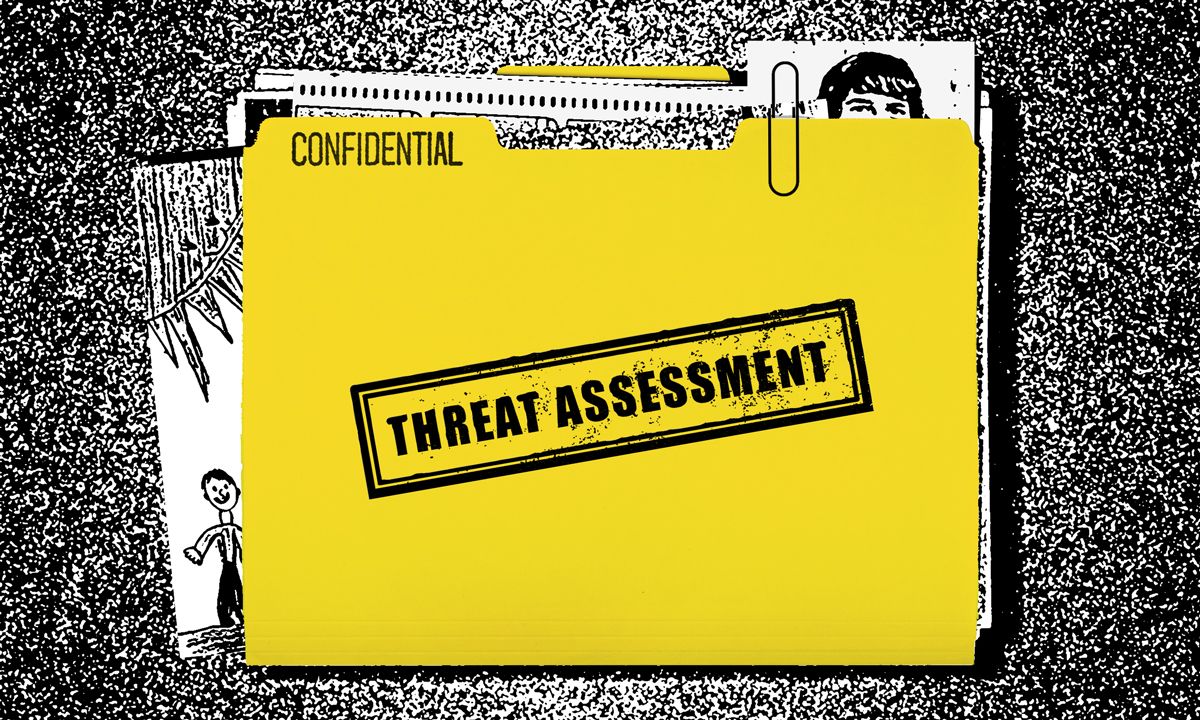Can Educators and Police Predict the Next School Shooter?
At first-ever national school safety summit, feds say “threat assessment” key to identifying future gunmen. Critics see civil rights nightmare

Get stories like these delivered straight to your inbox. Sign up for The 74 Newsletter
Every school shooting can be stopped — but educators and police must identify youth with an affinity for violence and spring to action before a single shot is fired.
That’s the message that federal law enforcement officials touted Tuesday during a first-ever National Summit on K-12 School Safety and Security hosted by the Cybersecurity and Infrastructure Security Agency, a division of the Department of Homeland Security. While a demographic profile of school shooters doesn’t exist, according to Secret Service research, soon-to-be gunmen exhibit signs that can be identified prior to attacks — such as a fixation on violence or a history of depression.
Officials endorsed “threat assessment,” an approach pioneered by the Secret Service that’s become a common but controversial strategy in schools to predict future perpetrators and prevent targeted campus violence. The Secret Service is part of Homeland Security.
“We’ve seen the tragedies that have happened when that information, on behavior that objectively elicits concern, was not acted on,” said Lina Alathari, chief of the Secret Service National Threat Assessment Center. “But we also need to make sure we’re setting a lower threshold for what we want to intervene with — such as being bullied, depression, suicidality — because we’ve also seen those in the background of these students that resorted to violence.”

Following the mass school shooting in May at a Uvalde, Texas, elementary school, districts statewide are set to receive nearly $8 million in federal funding for campus security, including for the creation of threat assessment teams.
Yet the deployment of such teams, which generally include school administrators, mental health officials and police officers, has civil rights groups on edge. Critics warn the approach could misidentify struggling students as future gunmen and unnecessarily push them into the juvenile justice system. While school shootings remain statistically rare, student behaviors that are factors in threat assessments — like alcohol use and a history of mental health issues — are exceedingly common.
Such concerns were largely downplayed at this week’s summit, a three-day virtual event where law enforcement officials, educators and other experts gathered to offer recommendations in responding to a range of campus security risks, including mass school shootings, cyber attacks and online extremism.
Steven Driscoll, the threat assessment center’s assistant chief, stressed that the approach is not “based on profiles or identifying types of students” but rather a focus on identifying threatening behaviors and intervening early.
“Schools need training not only on the behavioral threat assessment process best practices but also on things like implicit biases which have historically permeated a variety of school-based programs,” Driscoll said.
In a letter to the Education Department last year, a coalition of 50 student civil rights groups warned that the adoption of threat assessment in schools is “likely pushing many children of color and children with disabilities out of school, into the school-to-prison pipeline.”
“These ‘threat assessments’ are likely to target large numbers of children who aren’t actual threats — including disproportionate numbers of children of color and children with disabilities — and cause them significant and lasting harm, while doing little or nothing to increase safety in schools,” according to the letter, which was signed by groups including the National Center for Youth Law, the National Disability Rights Network and the Council of Parent Attorneys and Advocates. “In addition, they may refer children to services that do not exist.”
Last year, a Secret Service report analyzed 67 school violence plots that were thwarted between 2006 and 2018, finding that plotters in each case were met with criminal charges or arrests. Yet the “primary objective” of threat assessments is not to administer discipline, the report notes, but to “identify students in crisis or distress and provide robust interventions, before their behavior escalates to the point of criminality.”
Amy Lowder, the director of student safety and well-being at a suburban Charlotte, North Carolina school district, acknowledged during the summit that threat assessments conducted improperly can have detrimental effects on youth, including unnecessary student expulsions and juvenile justice referrals. That’s why it’s important, she said, for threat assessment teams to take “a whole-child approach in gathering the necessary information” about students causing concerns.
Meanwhile, Greg Johnson, a high school principal from West Liberty, Ohio, said that school leaders must balance students’ civil rights against their need to ensure campuses are secure. Johnson was principal of West Liberty High School in 2017 when a student shot and injured a classmate.
“You’ve got that balance because you want to support student rights and individual rights but you also want to keep people safe and that’s a huge responsibility,” Johnson said. “That’s a huge responsibility to keep your students safe.”
In an interview with The 74 that opened the summit, Homeland Security Secretary Alejando Mayorkas noted that there have been more than 250 reports of gunfire at schools in 2022, more than any other year on record.
Given the reality that school shooters often leak their plans to friends or online, summit panelists also endorsed a need to monitor students on the internet — a practice that has raised a separate set of civil rights and digital privacy concerns. That’s why it’s important for districts to employ experts in digital analyses, said Colton Easton, the project and training manager at Safer Schools Together, a Canadian-based, for-profit company that offers threat-assessment training and a team of threat analysts to assist districts in investigations.
“Maybe a student made a threat involving a gun and we see that gun posted on TikTok, we would consider that behaviors consistent with the threat and law enforcement could obtain a search warrant and remove access to the means,” Easton said. “Today, digital leakage is that golden ticket for school safety and threat assessment teams.”
Sign up for the School (in)Security newsletter.
Get the most critical news and information about students' rights, safety and well-being delivered straight to your inbox.
Get stories like these delivered straight to your inbox. Sign up for The 74 Newsletter

;)
